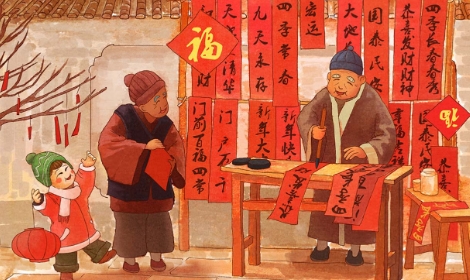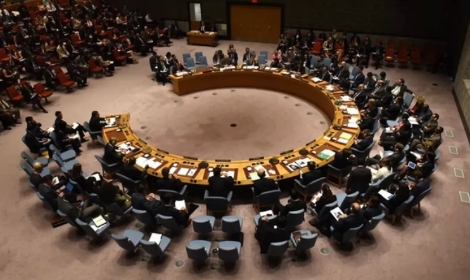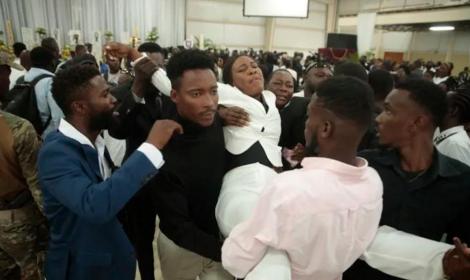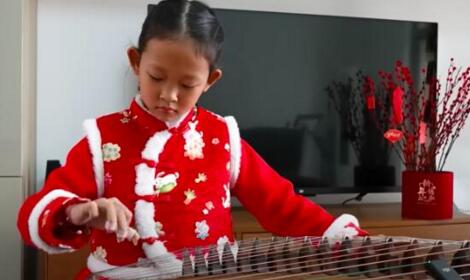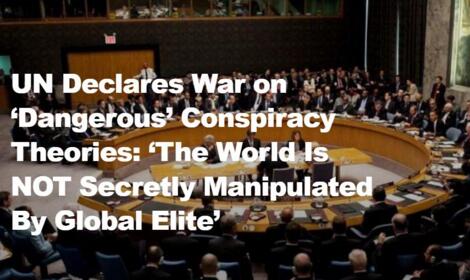联合国为何将农历新年定为联合国假日?阴历新年和中国新年有什么区别?
正文翻译

Profile photo for Super power lee
Super power lee
·
you have to understand history
China has a unique calendar, the "Agricultural Calendar", which is designed based on the cycles of the moon, so it is also called the "Lunar Calendar".
The first day of the new year is called "Spring Festival" by the Chinese.
But after this word is directly translated into English, it is difficult for people in the English-speaking world to understand its meaning. What's the meaning? "A festival celebrating the coming of spring"?
So, when the word was introduced to the Western world, they translated it as: "Chinese New Year"
This is easy to understand: on the first day of each year in the Chinese calendar
This festival has a very wide influence. Almost all countries around China will celebrate this festival. This is due to the huge influence of ancient China.
This festival has become the traditional culture of China's neighboring countries.
你必须要了解历史
中国有一套独特的历法,“农历”,它是根据月亮的运行周期而设计的,所以也被称为“阴历”。
新年的第一天,中国人称为“春节”。
但是这个词语直接翻译为英语之后,英语世界的人很难理解它的含义。什么意思?“庆祝春天来到的节日”?
所以,当这个词被引入到西方世界之后,他们翻译为:“中国新年”
这就很好理解了:在中国历法里每一年的第一天
这个节日影响非常广泛,中国周边几乎所有的国家都会庆祝这个节日,这是由于古代中国巨大的影响力造成的。
这个节日已经成为中国周边国家的传统文化。
Therefore, in English "Chinese New Year" = "Spring Festival" = "the first day of each year in the lunar calendar"
The United Nations included this holiday as a public holiday because of its widespread influence. In East Asia, the importance of Chinese New Year (Spring Festival) is equal to that of Christmas in the West.
But in the past 100 years, China has declined and the influence of Western culture has greatly increased. These influences have penetrated into China's neighboring countries, such as South Korea, Japan, Vietnam, Southeast Asian and South Asian countries. Today's China is described as an ignorant, backward, barbaric, authoritarian and bad country. So the "Chinese New Year" that they have inherited for thousands of years suddenly became an "evil symbol"
This is very embarrassing. Why do they want to pass down an "evil holiday" for hundreds of years?
Some people have come up with a new term: "Lunar New Year". They believe that this way they can successfully remove the Chinese elements, making this festival no longer related to China and becoming more "democratic and free" without even admitting that it comes from Chinese culture.
所以,在英语里“中国新年”=“春节”=“阴历每年的第一天”
联合国将这个节日纳入公共假日,也是因为它具有广泛的影响力。在东亚,中国新年(春节)和西方的圣诞节的重要性是等同的。
但是在过去的100年里,中国衰落了,西方文化的影响力大大增强,这些影响渗透到了中国周边国家,例如韩国、日本、越南、东南亚和南亚国家。现在的中国被描述为一个愚昧、落后的坏国家。
所以他们已经传承了上千年的“中国新年”,忽然成了“邪恶象征”
这就非常尴尬。为什么他们要把一个“邪恶节日”传承数百年?
一些人想出了一个新名词:“阴历新年”,他们认为这样就可以成功的去掉中国元素,使得这个节日不再和中国有关,变得更加“民主和自由”,甚至可以不在承认它来自于中国文化。
(译者注:Lunar New Year在中国国内普遍被翻译为“农历新年”,这是一个善意的翻译,但并不是真实的翻译)

Profile photo for Super power lee
Super power lee
·
you have to understand history
China has a unique calendar, the "Agricultural Calendar", which is designed based on the cycles of the moon, so it is also called the "Lunar Calendar".
The first day of the new year is called "Spring Festival" by the Chinese.
But after this word is directly translated into English, it is difficult for people in the English-speaking world to understand its meaning. What's the meaning? "A festival celebrating the coming of spring"?
So, when the word was introduced to the Western world, they translated it as: "Chinese New Year"
This is easy to understand: on the first day of each year in the Chinese calendar
This festival has a very wide influence. Almost all countries around China will celebrate this festival. This is due to the huge influence of ancient China.
This festival has become the traditional culture of China's neighboring countries.
你必须要了解历史
中国有一套独特的历法,“农历”,它是根据月亮的运行周期而设计的,所以也被称为“阴历”。
新年的第一天,中国人称为“春节”。
但是这个词语直接翻译为英语之后,英语世界的人很难理解它的含义。什么意思?“庆祝春天来到的节日”?
所以,当这个词被引入到西方世界之后,他们翻译为:“中国新年”
这就很好理解了:在中国历法里每一年的第一天
这个节日影响非常广泛,中国周边几乎所有的国家都会庆祝这个节日,这是由于古代中国巨大的影响力造成的。
这个节日已经成为中国周边国家的传统文化。
Therefore, in English "Chinese New Year" = "Spring Festival" = "the first day of each year in the lunar calendar"
The United Nations included this holiday as a public holiday because of its widespread influence. In East Asia, the importance of Chinese New Year (Spring Festival) is equal to that of Christmas in the West.
But in the past 100 years, China has declined and the influence of Western culture has greatly increased. These influences have penetrated into China's neighboring countries, such as South Korea, Japan, Vietnam, Southeast Asian and South Asian countries. Today's China is described as an ignorant, backward, barbaric, authoritarian and bad country. So the "Chinese New Year" that they have inherited for thousands of years suddenly became an "evil symbol"
This is very embarrassing. Why do they want to pass down an "evil holiday" for hundreds of years?
Some people have come up with a new term: "Lunar New Year". They believe that this way they can successfully remove the Chinese elements, making this festival no longer related to China and becoming more "democratic and free" without even admitting that it comes from Chinese culture.
所以,在英语里“中国新年”=“春节”=“阴历每年的第一天”
联合国将这个节日纳入公共假日,也是因为它具有广泛的影响力。在东亚,中国新年(春节)和西方的圣诞节的重要性是等同的。
但是在过去的100年里,中国衰落了,西方文化的影响力大大增强,这些影响渗透到了中国周边国家,例如韩国、日本、越南、东南亚和南亚国家。现在的中国被描述为一个愚昧、落后的坏国家。
所以他们已经传承了上千年的“中国新年”,忽然成了“邪恶象征”
这就非常尴尬。为什么他们要把一个“邪恶节日”传承数百年?
一些人想出了一个新名词:“阴历新年”,他们认为这样就可以成功的去掉中国元素,使得这个节日不再和中国有关,变得更加“民主和自由”,甚至可以不在承认它来自于中国文化。
(译者注:Lunar New Year在中国国内普遍被翻译为“农历新年”,这是一个善意的翻译,但并不是真实的翻译)
评论翻译
Profile photo for Hendrick Kung
Hendrick Kung
·
The whitewashing of China from Chinese New Year
"Wishing everyone around the world a happy and healthy #YearoftheRabbit and #YearoftheCat. The United States enters this Lunar New Year optimistic that we can join our friends and allies around the world to create a better future for all."- US Secretary of State Anthony blxen wrote on Twitter. While at first glance the message may seem a generic festival greeting, as has been seen many times, the tone of this message was in fact passive aggressive.
It was widely noted that first, it was narrowed to exclude only "friends and allies" and then secondly, all mention of China was excluded from it, either directly or indirectly, as if the message were not geared to them. The image which accompanied the tweet, which came with Hongbao envelopes, was also generically red, with no Chinese characters or inscxtions upon them. Anthony blxen had effectively marked a major Chinese occasion, by effectively ensuring it did not mention China at all.
从农历新年开始排除中国
“祝世界各地的每个人快乐健康。美国很快乐的进入这个农历新年,认为我们可以与世界各地的朋友和盟友一起为所有人创造更美好的未来。”——美国国务卿布林肯上次在推特上写道。虽然乍一看,这条消息似乎是一条普通的节日问候语,但正如我们多次看到的那样,这条消息的语气实际上是带有攻击性的。
首先,范围缩小到仅排除“朋友和盟友”。其次,所有提及中国的内容都被直接或间接地排除在外,就好像该信息不是针对他们的。这条推文附带的图片与红包信封一样,也是一般的红色,上面没有汉字或铭文。布林肯有效地确保了这一事件根本没有提及中国,从而有效地标志着中国的一个重要时刻。
Likewise, many anti-China Twitter accounts also took the opportunity to also celebrate "Lunar New Year" while excluding the concept of China from it altogether, deliberately. While of course it is true that the Lunisolar calendar is celebrated in other states, such as Vietnam and South Korea, and thus it has gained the name "Lunar New Year", it is nonetheless true that an aspect of identity politics has been added to it with the goal of removing association from China, the country that invented it. Having lived in Hong Kong myself I experienced this phenomenon directly, with Taiwan also doing the same thing.
While for the above locations this trend is not new, the rise of anti-China sentiment in the west has marked the emergence of a more concerted campaign to remove the "Chinese" from Chinese New Year, which has marked the more widespread usage of the terminology "Lunar New Year" in official discourse. As seen with the blxen tweet, this is most obvious at the highest levels of US officialdom, with past comparisons having been posted on Twitter showing how the US had no qualms about celebrating "Chinese New Year" in the past and wishing China well, but subsequently does now.
同样,许多反华推特账号也趁机庆祝“阴历新年”。同时故意将中国的概念完全排除在外。当然,越南和韩国等其他国家也庆祝阴历,因此得名“农历新年”,但确实增加了身份政治的一个方面其目的是从发明它的国家中国中消除联想。我自己在香港生活过,亲身经历过这种现象,台湾也有同样的情况。
虽然对于上述地区来说,这种趋势并不新鲜,但西方反华情绪的兴起标志着一场更加协调一致的消除“中国”形象的运动的出现。源自中国农历新年,这标志着“阴历新年”一词的使用更加广泛。在官方话语中。从布林肯的推文中可以看出,这一点在美国官方最高层表现得最为明显,推特上发布的过去的比较显示,美国在庆祝“中国新年”方面毫无顾虑。过去祝愿中国一切顺利,但现在却改变做法了。
In fact, it is now official US policy not to wish China "well" on anything. When the China Eastern Airlines disaster occurred last year, the US did not send any official condolences beyond the ambassadorial level. This is because any perceived goodwill towards China or attempt at "humanization" is seen as a soft-power gift to China and contravenes the new narrative of framing the country as an enemy state. This subsequently coincides with the bid to also, in favor of other countries diplomatically, the bid to now separate Chinese New Year from the notion of China itself, and for that matter even talk of Chinese people themselves celebrating it.
This logic of association of course works both ways. While good things such as Chinese New Year should "not be associated with China", on the other hand bad things, such as the covid-19 pandemic, are actively associated with China. Thus, it is apparently not correct to praise a cultural practice as being "Chinese" but it is perfectly okay to scapegoat the country for a pandemic and to spread conspiracy theories about its origin. This goes to show how the US government actively manipulates public discourse to either associate or disassociate things to its own advantage.
事实上,现在美国的官方政策是不希望中国“好”。在任何事情上,例如东航空难发生时,美国并未发出任何大使级以上的官方慰问。这是因为任何对中国的善意或“人性化”尝试都是不可接受的。被视为送给中国的软实力礼物,违反了将中国定性为敌国的新叙述。随后,这与在外交上支持其他国家的努力相一致,即现在将阴历新年与中国本身的概念分开,甚至谈论中国人民自己庆祝新年。
当然,这种关联逻辑是双向的。虽然像阴历新年这样的好事“不应该与中国联系在一起”,但另一方面,像covid-19大流行这样的坏事却积极地与中国联系在一起。因此,称赞一种文化习俗是“中国的”显然是不正确的。但将流行病归咎于该国并传播有关其起源的阴谋论是完全可以的。这表明美国政府如何积极操纵公众话语,将事物与自己的利益联系起来或分离。
For China's people themselves, this is gravely insulting. Not only did they create the Lunisolar calendar, but they are the single largest country that celebrates it and it is the biggest event of the year, for 1.4 billion people (not including the worldwide Chinese diaspora). Yet apparently, that should be played down or dismissed just to quell the sensitivities of countries who have adapted this practice, but have a problem acknowledging where it came from.
While it is of course true on the other hand that festivals such as "Christmas" do not belong to a specific country or nationality, and can be open to whosoever seeks to celebrate it, at the same time the Chinese New Year debate is actively being fuelled by the hatred and phobia of a certain country, and in turn official actors are now encouraging this behavior. Whatever happened to the old dictum Anti-China voices claim to adhere to: "Love the Chinese people, hate the government", yet again the mask slips and it becomes scathingly apparent that in fact it is all things Chinese that are hated, including Chinese New Year, which of course has nothing to do with Communism whatsoever.
对于中国人民本身来说,这是极大的侮辱。他们不仅创造了阴历,而且是庆祝阴历的最大国家,而且对于14亿人(不包括世界各地的华人)来说,这是一年中最盛大的活动。但显然,应该淡化或忽视这一点,只是为了维护那些采用这个节日但认为其来源存在问题的国家的玻璃心。
另一方面,诸如“圣诞节”之类的节日当然是真实的。不属于特定国家或民族,可以向任何想要庆祝的人开放,与此同时,对某个国家的仇恨和恐惧正在积极推动阴历新年的辩论,反过来,官方行为者也受到了影响。现在鼓励这种行为。无论反华声音声所说“爱中国人民,恨政府”这句老格言发生了什么变化,他们的面具再次滑落,变得那么尖刻。事实上,所有中国人都被憎恨,包括中国的新年。
Profile photo for Nedryel
Nedryel
· 11mo
That's nothing new with the United States. I'm French and when France vetoed the invasion of Irak at the UN, the US tried to rename everything with “French” in it, using “freedom” instead. Like “freedom fries”. That's pathetic. It won't work and it won't last.
这对美国来说不是什么新鲜事。我是法国人,当法国在联合国否决入侵伊拉克时,美国试图把“法国”有关的一切重新命名,而用“自由”代替。就像“自由薯条”一样。这太可悲了。它不会起作用,也不会持久。
Profile photo for En Chen
En Chen
· 11mo
We Chinese never say happy Chinese new year. It’s quite ridiculous. 祝大家中國新年快樂! While there are Anti-Chinese sentiments, Chinese preferring Chinese lunar new year are thin skinned and quite easy to provoke.
我们中国人从不说新年快乐。这太荒谬了。祝大家中国新年快乐!虽然存在排华情绪,但喜欢过年的中国人脸皮薄,很容易被激怒。
Profile photo for Kevin Lo
Kevin Lo
· 11mo
fuxk the western .
干西方
Profile photo for JimmY LEE
JimmY LEE
· 11mo
I don’t wish people happy Chinese New Year OR happy Lunar New Year. For Chinese it’s just Happy New Year! Because that is what it is for them. Just like on Jan 1st I don’t wish people Happy White People New Year. (Actually I did a couple times as a joke but I got funny looks and a frown.)
我不祝人们中国新年快乐或农历新年快乐。对于中国人来说,就是新年快乐!因为这就是他们的目的。就像1月1日一样,我不祝人们白人新年快乐。 (实际上,我开玩笑地说过几次,但我得到了滑稽的表情和皱眉。)
Profile photo for Gabriel Kuan
Gabriel Kuan
· 11mo
Lunar new year is meant to be for those in Asia who celebrate the lunar new year. Chinese new year is for China or those of Chinese ethnicity. In vietnam they call it tet, in Korea it's called seollol. Lunar new year is just to try to include other Asians under the same umbrella. I still call it Chinese new year among ethnic Chinese people. Lunar new year with other Asians or just simply happy new year.
阴历新年对于那些庆祝农历新年的亚洲人来说是有意义的。中国的新年是属于中国或华裔的。在越南,他们称之为 tet,在韩国,他们称之为seollol。阴历新年只是试图将其他亚洲人纳入同一保护伞下。我在华人中仍然称其为中国新年。与其他亚洲人一起过阴历新年,或者只是简单的新年快乐。
Profile photo for John Smith (Alias)
John Smith (Alias)
· 11mo
One problem that I notice though that supports the theory presented here.
I was born and lived in Vancouver, BC for over 25 years. Never has anyone called it “Lunar New Year” up until 2022–2023. Vancouver has a higher-than-average population of Asian & Chinese people in contrast to elsewhere in Canada. It was still called “Happy Chinese New Year”.
I don’t actually celebrate it myself so I could hardly give a sh** what its called. But I highly doubt this term-switching was unintentional.
我注意到一个问题支持这里提出的理论。
我在不列颠哥伦比亚省温哥华出生并生活了超过25年。直到2022年至2023年,从未有人称其为“阴历新年”。温哥华的亚裔和白人人口高于平均水平。中国人与加拿大其他地方的人形成鲜明对比。仍然叫“新年快乐”。
我自己实际上并没有庆祝它,所以我根本不在乎它叫什么。但我非常怀疑这种术语转换是无意的。
Profile photo for En Chen
En Chen
· 11mo
It’s intentional but in Mandarin or Cantonese, it is never “Chinese” new year so why should it be in English?
这是故意的,但用普通话或粤语来说,这从来都不是“中国”新年,所以为什么要用英语呢?
Profile photo for John Smith (Alias)
Profile photo for John Smith (Alias)
John Smith (Alias)
· 11mo
“We” did a lot of tiptoeing because Chinese immigrants who came here had “no ground to stand on” (power/influence) so to speak.
“Happy Chinese New Year” was common because it was often the Chinese immigrants who held onto this tradition. And since again China was much weaker back then, no one bothered to study and learn the proper translations.
As a Chinese person myself, I can recognize this and accept it. But when I see a bunch of (likely paid) accounts who are telling me that Chinese New Year has always been Lunar New Year? Lol ok. Something else more malicious is going on.
“我们”之所以小心翼翼,是因为来到这里的中国移民可以说“没有立足之地”(权力/影响力)。
“新年快乐”很常见,因为往往是中国移民保留了这一传统。而且当时的中国又弱得多,没有人费心去研究和学习正确的翻译。
作为一个中国人,我能够认识到这一点并接受这一点。但是当我看到一堆(可能是付费的)帐户告诉我阴历新年一直是阴历新年时?哈哈,好吧。还有其他更恶意的事情正在发生。
Profile photo for En Chen
En Chen
· 11mo
Definitely. In Japan, we have the Japanese eggplant (it’s just an eggplant) or Japanese pumpkin (just a squash). I can see how the early Chinese immigrants tried to distinguished the lunar from the solar new year.
确实。在日本,我们有日本茄子(只是茄子)或日本南瓜(只是南瓜)。我可以看到早期的中国移民如何试图区分阴历新年公历新年。
Profile photo for Hunter Zhou
Hunter Zhou
· 11mo
Do you call the new year English New Year?
你把新年称为“English New Year”吗?
Profile photo for En Chen
En Chen
· 11mo
Exactly.
确实
Profile photo for YF Chew
YF Chew
· 11mo
White-washing? The Japanese, Korean and Vietnamese celebrate lunar new year too.
粉饰?日本、韩国和越南也庆祝阴历新年。
Profile photo for YTSatan Hypc
YTSatan Hypc
· 11mo
Read throughoufully, dude. that US the warmonger exclude China from Chinnese New Year itself while Chinese New Year its create by China's first
通读一遍,伙计。美国这个战争贩子将中国排除在阴历新年之外,而阴历新年是中国第一个创造的
Profile photo for Quinton Smith
Quinton Smith
· 11mo
The Japanese, Korean and Vietnamese decided at one point in ancient time to ADAPT the use of Chinese calendar system for themselves and thus celebrate the Chinese new year. The system which it's based upon is irrelevant, those countries didn't invent it, they just took it and use it. Give credit where it's due.
日本、韩国和越南人在古代曾一度决定采用中国历法来庆祝中国新年。它所基于的系统是无关紧要的,那些国家没有发明它,他们只是采用它并使用它。给予应得的信任。
Profile photo for Charlene
Charlene
· 11mo
The Japanese do not celebrate the lunar new year…
日本人不庆祝阴历新年...
Profile photo for Mark Larkin
Mark Larkin
· 11mo
Happy holidays my perma-victim friend
节日快乐,我的永久受害者朋友
Profile photo for Nguyễn Ngọc Đức Thịnh
Nguyễn Ngọc Đức Thịnh
· 11mo
Real cultured people says “Happy New Year”, treating it as the true new year. If you have to say happy “lunar new year” or happy “Chinese new year”, then you are all kinda pathetic, treating this special new year as some kind of secondary importance.
真正有文化的人会说“新年快乐”,把它当作真正的新年。如果你非要说“中国新年快乐”或者“阴历新年快乐”,那么你们都有点可怜,把这个特殊的新年视为次要的。
In Vietnam, for hundreds of years
We call this day "New Year". There is no such thing as "Chinese New Year" or "Lunar New Year"
Some people deliberately politicize traditional culture
They are trying to tell the Vietnamese that we have nothing to do with China
But it's like a camel burying its head in the sand
Meaningless
在越南,数百年来
我们把这一天叫做“新年”,并没有“中国新年”和“阴历新年”的说法
有些人刻意把传统文化政治化了
他们试图告诉越南人,我们和中国没关系
但是这犹如把头埋进沙子里的骆驼
毫无意义
Profile photo for Peter Sim
Peter Sim
· 11mo
We Chinese living outside China don’t give a shit to what US is trying to play or manipulate….just ignore the country that is in the fall & break, leave them in isolation!
我们生活在中国境外的中国人根本不在乎美国试图玩弄或操纵什么......只是忽略这个正在堕落和发展的国家。让他们孤立吧!
Hendrick Kung
·
The whitewashing of China from Chinese New Year
"Wishing everyone around the world a happy and healthy #YearoftheRabbit and #YearoftheCat. The United States enters this Lunar New Year optimistic that we can join our friends and allies around the world to create a better future for all."- US Secretary of State Anthony blxen wrote on Twitter. While at first glance the message may seem a generic festival greeting, as has been seen many times, the tone of this message was in fact passive aggressive.
It was widely noted that first, it was narrowed to exclude only "friends and allies" and then secondly, all mention of China was excluded from it, either directly or indirectly, as if the message were not geared to them. The image which accompanied the tweet, which came with Hongbao envelopes, was also generically red, with no Chinese characters or inscxtions upon them. Anthony blxen had effectively marked a major Chinese occasion, by effectively ensuring it did not mention China at all.
从农历新年开始排除中国
“祝世界各地的每个人快乐健康。美国很快乐的进入这个农历新年,认为我们可以与世界各地的朋友和盟友一起为所有人创造更美好的未来。”——美国国务卿布林肯上次在推特上写道。虽然乍一看,这条消息似乎是一条普通的节日问候语,但正如我们多次看到的那样,这条消息的语气实际上是带有攻击性的。
首先,范围缩小到仅排除“朋友和盟友”。其次,所有提及中国的内容都被直接或间接地排除在外,就好像该信息不是针对他们的。这条推文附带的图片与红包信封一样,也是一般的红色,上面没有汉字或铭文。布林肯有效地确保了这一事件根本没有提及中国,从而有效地标志着中国的一个重要时刻。
Likewise, many anti-China Twitter accounts also took the opportunity to also celebrate "Lunar New Year" while excluding the concept of China from it altogether, deliberately. While of course it is true that the Lunisolar calendar is celebrated in other states, such as Vietnam and South Korea, and thus it has gained the name "Lunar New Year", it is nonetheless true that an aspect of identity politics has been added to it with the goal of removing association from China, the country that invented it. Having lived in Hong Kong myself I experienced this phenomenon directly, with Taiwan also doing the same thing.
While for the above locations this trend is not new, the rise of anti-China sentiment in the west has marked the emergence of a more concerted campaign to remove the "Chinese" from Chinese New Year, which has marked the more widespread usage of the terminology "Lunar New Year" in official discourse. As seen with the blxen tweet, this is most obvious at the highest levels of US officialdom, with past comparisons having been posted on Twitter showing how the US had no qualms about celebrating "Chinese New Year" in the past and wishing China well, but subsequently does now.
同样,许多反华推特账号也趁机庆祝“阴历新年”。同时故意将中国的概念完全排除在外。当然,越南和韩国等其他国家也庆祝阴历,因此得名“农历新年”,但确实增加了身份政治的一个方面其目的是从发明它的国家中国中消除联想。我自己在香港生活过,亲身经历过这种现象,台湾也有同样的情况。
虽然对于上述地区来说,这种趋势并不新鲜,但西方反华情绪的兴起标志着一场更加协调一致的消除“中国”形象的运动的出现。源自中国农历新年,这标志着“阴历新年”一词的使用更加广泛。在官方话语中。从布林肯的推文中可以看出,这一点在美国官方最高层表现得最为明显,推特上发布的过去的比较显示,美国在庆祝“中国新年”方面毫无顾虑。过去祝愿中国一切顺利,但现在却改变做法了。
In fact, it is now official US policy not to wish China "well" on anything. When the China Eastern Airlines disaster occurred last year, the US did not send any official condolences beyond the ambassadorial level. This is because any perceived goodwill towards China or attempt at "humanization" is seen as a soft-power gift to China and contravenes the new narrative of framing the country as an enemy state. This subsequently coincides with the bid to also, in favor of other countries diplomatically, the bid to now separate Chinese New Year from the notion of China itself, and for that matter even talk of Chinese people themselves celebrating it.
This logic of association of course works both ways. While good things such as Chinese New Year should "not be associated with China", on the other hand bad things, such as the covid-19 pandemic, are actively associated with China. Thus, it is apparently not correct to praise a cultural practice as being "Chinese" but it is perfectly okay to scapegoat the country for a pandemic and to spread conspiracy theories about its origin. This goes to show how the US government actively manipulates public discourse to either associate or disassociate things to its own advantage.
事实上,现在美国的官方政策是不希望中国“好”。在任何事情上,例如东航空难发生时,美国并未发出任何大使级以上的官方慰问。这是因为任何对中国的善意或“人性化”尝试都是不可接受的。被视为送给中国的软实力礼物,违反了将中国定性为敌国的新叙述。随后,这与在外交上支持其他国家的努力相一致,即现在将阴历新年与中国本身的概念分开,甚至谈论中国人民自己庆祝新年。
当然,这种关联逻辑是双向的。虽然像阴历新年这样的好事“不应该与中国联系在一起”,但另一方面,像covid-19大流行这样的坏事却积极地与中国联系在一起。因此,称赞一种文化习俗是“中国的”显然是不正确的。但将流行病归咎于该国并传播有关其起源的阴谋论是完全可以的。这表明美国政府如何积极操纵公众话语,将事物与自己的利益联系起来或分离。
For China's people themselves, this is gravely insulting. Not only did they create the Lunisolar calendar, but they are the single largest country that celebrates it and it is the biggest event of the year, for 1.4 billion people (not including the worldwide Chinese diaspora). Yet apparently, that should be played down or dismissed just to quell the sensitivities of countries who have adapted this practice, but have a problem acknowledging where it came from.
While it is of course true on the other hand that festivals such as "Christmas" do not belong to a specific country or nationality, and can be open to whosoever seeks to celebrate it, at the same time the Chinese New Year debate is actively being fuelled by the hatred and phobia of a certain country, and in turn official actors are now encouraging this behavior. Whatever happened to the old dictum Anti-China voices claim to adhere to: "Love the Chinese people, hate the government", yet again the mask slips and it becomes scathingly apparent that in fact it is all things Chinese that are hated, including Chinese New Year, which of course has nothing to do with Communism whatsoever.
对于中国人民本身来说,这是极大的侮辱。他们不仅创造了阴历,而且是庆祝阴历的最大国家,而且对于14亿人(不包括世界各地的华人)来说,这是一年中最盛大的活动。但显然,应该淡化或忽视这一点,只是为了维护那些采用这个节日但认为其来源存在问题的国家的玻璃心。
另一方面,诸如“圣诞节”之类的节日当然是真实的。不属于特定国家或民族,可以向任何想要庆祝的人开放,与此同时,对某个国家的仇恨和恐惧正在积极推动阴历新年的辩论,反过来,官方行为者也受到了影响。现在鼓励这种行为。无论反华声音声所说“爱中国人民,恨政府”这句老格言发生了什么变化,他们的面具再次滑落,变得那么尖刻。事实上,所有中国人都被憎恨,包括中国的新年。
Profile photo for Nedryel
Nedryel
· 11mo
That's nothing new with the United States. I'm French and when France vetoed the invasion of Irak at the UN, the US tried to rename everything with “French” in it, using “freedom” instead. Like “freedom fries”. That's pathetic. It won't work and it won't last.
这对美国来说不是什么新鲜事。我是法国人,当法国在联合国否决入侵伊拉克时,美国试图把“法国”有关的一切重新命名,而用“自由”代替。就像“自由薯条”一样。这太可悲了。它不会起作用,也不会持久。
Profile photo for En Chen
En Chen
· 11mo
We Chinese never say happy Chinese new year. It’s quite ridiculous. 祝大家中國新年快樂! While there are Anti-Chinese sentiments, Chinese preferring Chinese lunar new year are thin skinned and quite easy to provoke.
我们中国人从不说新年快乐。这太荒谬了。祝大家中国新年快乐!虽然存在排华情绪,但喜欢过年的中国人脸皮薄,很容易被激怒。
Profile photo for Kevin Lo
Kevin Lo
· 11mo
fuxk the western .
干西方
Profile photo for JimmY LEE
JimmY LEE
· 11mo
I don’t wish people happy Chinese New Year OR happy Lunar New Year. For Chinese it’s just Happy New Year! Because that is what it is for them. Just like on Jan 1st I don’t wish people Happy White People New Year. (Actually I did a couple times as a joke but I got funny looks and a frown.)
我不祝人们中国新年快乐或农历新年快乐。对于中国人来说,就是新年快乐!因为这就是他们的目的。就像1月1日一样,我不祝人们白人新年快乐。 (实际上,我开玩笑地说过几次,但我得到了滑稽的表情和皱眉。)
Profile photo for Gabriel Kuan
Gabriel Kuan
· 11mo
Lunar new year is meant to be for those in Asia who celebrate the lunar new year. Chinese new year is for China or those of Chinese ethnicity. In vietnam they call it tet, in Korea it's called seollol. Lunar new year is just to try to include other Asians under the same umbrella. I still call it Chinese new year among ethnic Chinese people. Lunar new year with other Asians or just simply happy new year.
阴历新年对于那些庆祝农历新年的亚洲人来说是有意义的。中国的新年是属于中国或华裔的。在越南,他们称之为 tet,在韩国,他们称之为seollol。阴历新年只是试图将其他亚洲人纳入同一保护伞下。我在华人中仍然称其为中国新年。与其他亚洲人一起过阴历新年,或者只是简单的新年快乐。
Profile photo for John Smith (Alias)
John Smith (Alias)
· 11mo
One problem that I notice though that supports the theory presented here.
I was born and lived in Vancouver, BC for over 25 years. Never has anyone called it “Lunar New Year” up until 2022–2023. Vancouver has a higher-than-average population of Asian & Chinese people in contrast to elsewhere in Canada. It was still called “Happy Chinese New Year”.
I don’t actually celebrate it myself so I could hardly give a sh** what its called. But I highly doubt this term-switching was unintentional.
我注意到一个问题支持这里提出的理论。
我在不列颠哥伦比亚省温哥华出生并生活了超过25年。直到2022年至2023年,从未有人称其为“阴历新年”。温哥华的亚裔和白人人口高于平均水平。中国人与加拿大其他地方的人形成鲜明对比。仍然叫“新年快乐”。
我自己实际上并没有庆祝它,所以我根本不在乎它叫什么。但我非常怀疑这种术语转换是无意的。
Profile photo for En Chen
En Chen
· 11mo
It’s intentional but in Mandarin or Cantonese, it is never “Chinese” new year so why should it be in English?
这是故意的,但用普通话或粤语来说,这从来都不是“中国”新年,所以为什么要用英语呢?
Profile photo for John Smith (Alias)
Profile photo for John Smith (Alias)
John Smith (Alias)
· 11mo
“We” did a lot of tiptoeing because Chinese immigrants who came here had “no ground to stand on” (power/influence) so to speak.
“Happy Chinese New Year” was common because it was often the Chinese immigrants who held onto this tradition. And since again China was much weaker back then, no one bothered to study and learn the proper translations.
As a Chinese person myself, I can recognize this and accept it. But when I see a bunch of (likely paid) accounts who are telling me that Chinese New Year has always been Lunar New Year? Lol ok. Something else more malicious is going on.
“我们”之所以小心翼翼,是因为来到这里的中国移民可以说“没有立足之地”(权力/影响力)。
“新年快乐”很常见,因为往往是中国移民保留了这一传统。而且当时的中国又弱得多,没有人费心去研究和学习正确的翻译。
作为一个中国人,我能够认识到这一点并接受这一点。但是当我看到一堆(可能是付费的)帐户告诉我阴历新年一直是阴历新年时?哈哈,好吧。还有其他更恶意的事情正在发生。
Profile photo for En Chen
En Chen
· 11mo
Definitely. In Japan, we have the Japanese eggplant (it’s just an eggplant) or Japanese pumpkin (just a squash). I can see how the early Chinese immigrants tried to distinguished the lunar from the solar new year.
确实。在日本,我们有日本茄子(只是茄子)或日本南瓜(只是南瓜)。我可以看到早期的中国移民如何试图区分阴历新年公历新年。
Profile photo for Hunter Zhou
Hunter Zhou
· 11mo
Do you call the new year English New Year?
你把新年称为“English New Year”吗?
Profile photo for En Chen
En Chen
· 11mo
Exactly.
确实
Profile photo for YF Chew
YF Chew
· 11mo
White-washing? The Japanese, Korean and Vietnamese celebrate lunar new year too.
粉饰?日本、韩国和越南也庆祝阴历新年。
Profile photo for YTSatan Hypc
YTSatan Hypc
· 11mo
Read throughoufully, dude. that US the warmonger exclude China from Chinnese New Year itself while Chinese New Year its create by China's first
通读一遍,伙计。美国这个战争贩子将中国排除在阴历新年之外,而阴历新年是中国第一个创造的
Profile photo for Quinton Smith
Quinton Smith
· 11mo
The Japanese, Korean and Vietnamese decided at one point in ancient time to ADAPT the use of Chinese calendar system for themselves and thus celebrate the Chinese new year. The system which it's based upon is irrelevant, those countries didn't invent it, they just took it and use it. Give credit where it's due.
日本、韩国和越南人在古代曾一度决定采用中国历法来庆祝中国新年。它所基于的系统是无关紧要的,那些国家没有发明它,他们只是采用它并使用它。给予应得的信任。
Profile photo for Charlene
Charlene
· 11mo
The Japanese do not celebrate the lunar new year…
日本人不庆祝阴历新年...
Profile photo for Mark Larkin
Mark Larkin
· 11mo
Happy holidays my perma-victim friend
节日快乐,我的永久受害者朋友
Profile photo for Nguyễn Ngọc Đức Thịnh
Nguyễn Ngọc Đức Thịnh
· 11mo
Real cultured people says “Happy New Year”, treating it as the true new year. If you have to say happy “lunar new year” or happy “Chinese new year”, then you are all kinda pathetic, treating this special new year as some kind of secondary importance.
真正有文化的人会说“新年快乐”,把它当作真正的新年。如果你非要说“中国新年快乐”或者“阴历新年快乐”,那么你们都有点可怜,把这个特殊的新年视为次要的。
In Vietnam, for hundreds of years
We call this day "New Year". There is no such thing as "Chinese New Year" or "Lunar New Year"
Some people deliberately politicize traditional culture
They are trying to tell the Vietnamese that we have nothing to do with China
But it's like a camel burying its head in the sand
Meaningless
在越南,数百年来
我们把这一天叫做“新年”,并没有“中国新年”和“阴历新年”的说法
有些人刻意把传统文化政治化了
他们试图告诉越南人,我们和中国没关系
但是这犹如把头埋进沙子里的骆驼
毫无意义
Profile photo for Peter Sim
Peter Sim
· 11mo
We Chinese living outside China don’t give a shit to what US is trying to play or manipulate….just ignore the country that is in the fall & break, leave them in isolation!
我们生活在中国境外的中国人根本不在乎美国试图玩弄或操纵什么......只是忽略这个正在堕落和发展的国家。让他们孤立吧!

